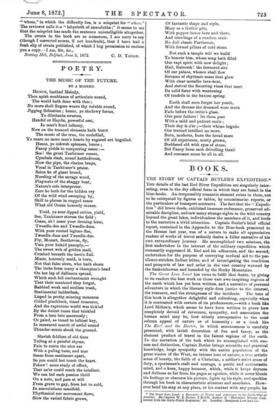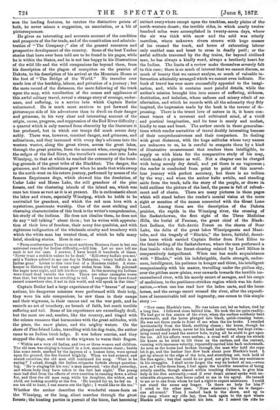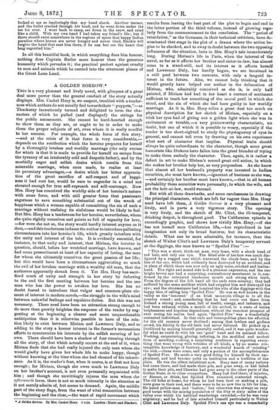BOOKS.
THE STORY OF CAPTAIN BUTLER'S EXPEDITION.* THE details of the last Red River Expedition are singularly inter- esting, even in the dry official form in which they are found in the blue-books. An irrepressibly romantic element exists in them, not to be extirpated by figures or tables, by commissariat reports, or the particulars of transport contracts. The fact that the" Expedi- tion " did brave deeds, exhibited immense endurance, preserved ad- mirable discipline, and saw many strange sights in the wild country beyond the great lakes, individualises the members of it, and lends to the narrative a vivid attraction. Captain Butler's brief official report, contained in the Appendix to the Blue-book presented to the Houses last year, was of a nature to make all appreciative readers of works of travel ardently desire a fuller narrative of his own extraordinary journey. He accomplished two missions, the first undertaken in the interest of the military expedition which summarily suppressed M. Riel and his adherents, and the second, undertaken for the purpose of conveying medical aid to the pes- tilence-stricken Indian tribes, and of investigating the condition and prospects of law and order in the vast country watered by the Saskatchawan and bounded by the Rocky Mountains.
The Great Lone Land has come to fulfil that desire, by giving to its readers the best work on those vast awe-inspiring regions of the earth which has yet been written, and a narrative of personal adventure in which the literary style does justice to the interest, the romance, and the strangeness of the incidents. The tone of this book is altogether delightful and refreshing, especially when it is contrasted with certain of its predecessors,—with a book like Lord Milton's, which seems to have been written to prove how completely devoid of reverence, sympathy, and association the human mind may be, how utterly unresponsive to the most solemn appeal of nature or of humanity ; or a book like The Earl and the Doctor, in which sensuousness is carefully presented, with lavish decoration of fun and fancy, as the choicest product of travel in the fairest regions of the earth. To the narration of the task which he accomplished with suc- cess and distinction, Captain Butler brings scientific and practical knowledge, large sympathy with the native population of the great wastes of the West, an intense love of nature, a true artistic sense of beauty, the faith of a Christian, a soldier's strict sense of duty, a sportsman's craft and courage, a poetic and enthusiastic mind, and a keen, happy humour, which, while it keeps dryness and dullness as far from his pages as egotism, while it never blunts his feelings or obscures his picture, lights up his style, and sparkles through his book in characteristic allusions and anecdotes. How- ever brief his stay at any place, or his contact with any people, he
• The Great Lone Land: a Narrative of Travel and Adventure in the North-West of America. By Captain W. E. Butler, F.R.G.S., Author of 'Historical Events Con- nected with the Sixty-Ninth Regiment," &c. London : Sampson Low and Co. sees the leading features, he catches the distinctive points of both, he never misses a suggestion, an association, or a bit of
picturesqueness.
He gives an interesting and accurate account of the condition and prospects of the fur trade, and of the constitution and adminis- tration of "The Company ;" also of the general resources and prospective development of the country. Some of the best Yankee stories that have ever been told are to be found in his pages, while he is within the States, and he is not less happy in his illustrations of the wild life and the wild companions far beyond them, from his description of the plague of mosquitos on the prairies of Dakota, to his description of his arrival at the Mountain House at the foot of "The Bridge of the World." No traveller ever made less of the hardship, labour, and privation of a journey ; but the mere record of the distances, the mere following of the track upon the map, with recollection of the means and appliances of this awful solitary travel, reveal a strange story of courage, endur- ance, and suffering, in a service into which Captain Butler volunteered. He is much more anxious to put forward the picturesque side of his adventures than to dwell on their danger and grimness, in his very clear and interesting account of the origin, cause, progress, and suppression of the Red River difficulty ; a quarrel which is only rescued from obscurity by the literature it has produced, but in which our troops did much severe duty nobly. There was, however, constant danger, and grimness, and solitariness, and they increased with every day's advance into the western wastes, along the great rivers, across the great lakes, through the great prairies, from the moment when, emerging from the sedges of the Red River, the traveller's canoe shot into Lake Winnipeg, to that at which he reached the extremity of the hunt- ing-grounds of the great tribe of the Blackfeet. The danger, the grimness, and the solitariness grew when he made that wide sweep to the north-west on his return journey, performed by means of the famous Esquimaux dogs, which showed him the desolation of Cedar Lake and Moose Lake, the still grandeur of the pine forests, and the clustering islands of the inland sea, which was once ten times as vast as it is at present. He is enthusiastic about the lakes and rivers, especially Winnipeg, which he holds to be unrivalled for grandeur, and which the red men love with a mysterious, passionate worship. One of the most striking and charming characteristics of this book is the writer's comprehension, his study of the Indians. He does not idealise them, he does not do any "tall talking" about them ; but he writes with apprecia- tion of their love of freedom, their many fine qualities, and with righteous indignation of the wholesale cruelty and treachery with which the white man has treated them, of which he tells many brief, shocking stories. Here is one :—
" From southernmost Texas to most northern Montana there is but one universal remedy for Indian difficulty,—kill him. Let no man tell me such is not the case. I answer, I have heard it hundreds of times. 'Never trust a redskin unless he be dead." Kill every buffalo you see,' said a Yankee colonel to me one day in Nebraska ; 'every buffalo is an Indian gone.' Listen to this 'cute feat of a Montana trader. A store- keeper in Helena city had some sugar stolen from him. He poisoned the sugar next night, and left his door open. In the morning six Indians were found dead outside the town. There are other examples worse than that, but they are too revolting to tell. I suppose they have found record somewhere else, if not in this world, and will speak in due time."
Captain Butler had a large experience of the "braves" of many nations, his dangerous missions were performed with their help, they were his sole companions, he saw them in their camps and their wigwams, in their canoes and on the war path, and he records no act of treachery, no breach of faith, but much terrible suffering and toil. Some of his experiences are exceedingly droll, but the most are sad, sombre, like the country, and tinged with the solemn romance that harmonises with the great solitudes, with the pines, the snow plains, and the mighty waters. On the shore of Pine Island Lake, travelling with his dog-train, the author came to an Indian birch lodge. It was before sunrise, and they stopped the dogs, and went to the wigwam to warm their fingers.
"Within sat a very old Indian, and two or three women and children. The old man was singing to himself in a low, monotonous chant ; beside him some reeds, marked by the impress of a human form, were spread upon the ground, the fire burned brightly. When we had entered, and seated ourselves, the old man still continued his song. ' What is he saying?' I asked, though the Indian etiquette forbids abrupt question-
ing. is singing for his son,' a man answered, 'who died yesterday, and whose body they have taken to the fort last night.' The young man had died from the effects of over-exertion in running down a silver fox, and thus the old man sang, while his daughter, the widow, and a child, sat looking moodily at the fire. 'He hunted for us, be fed us. I am too old to hunt, I can scarce see the light ; I would like to die too.'"
Whether the author describes the wonderful canoe-feats on the Winnipeg, or the long, silent marches through the great forests ; the hunting parties in pursuit of the bison, fast becoming extinct everywhere except upon the trackless, sandy plains of north-western desert ; the terrible rides, in which nearly twelve- hundred miles were accomplished in twenty-seven days, where' the air was thick with snow and the cold was utterly merciless, where unknown rivers strewn with huge masses of ice crossed the track, and hours of exhausting labour only enabled man and beast to cross in deadly peril ; or the- awful solitude traversed by the dog trains, far beyond civilised man, he has always a kindly word, always a brotherly heart for the Indian. The limits of a review make themselves severely felt in this case; there is so much of interest that we cannot discuss, so- much of beauty that we cannot analyse, so much of valuable in- formation admirably arranged which we cannot even indicate. No. book of travel has ever more successfully appealed to the imagi- nation, and, while it contains most painful details, while the' author's mission brought him into scenes of suffering, sickness, destitution, and isolation, whose sadness and misery admit of no- alleviation, and which he records with all the solemnity they fitly inspired, the impression made by the book is the reverse of de-- pressing. There is the truest love of nature in it, it bears con- stant traces of a reverent and cultivated mind, of a vivid; and poetical imagination, and its tone is manly and modest, kindly to man and beast. The author excels in those generalisa- tions which render narratives of travel doubly interesting because- of their comprehensiveness and their comparison. In dealing with great distances, with the huge solitudes whose very names are unknown to us, he is careful to compute them by a kind of illustrative measurement that renders them intelligible, to- supply us with hints for the comparative study of his map, which make it a picture as well. Not a chapter can be charged with being merely dry detail, and yet there is no vagueness the reader is conducted from point to point of this marvel- lous journey with perfect accuracy, but there is no tedium. by the way ; and when the author halts awhile, and standing aside from the track, tells the story of the people, or draws in, bold outlines the picture of the land, the pause is full of refresh- ment and of charm. There are many pictures in these pagea.
which will stand before the reader's mental vision at the mere. sight or mention of the names connected with the Great Lone. Land. Among them are the description of the Dakota prairies, the rapids in the Winnipeg river, the crossing of the Saskatchewan, the first sight of the Three Medicine Hills, the burial of Penoam, the great chief of the Black- feet Indians, the Sub-Arctic Forest on the shores of Bear Lake, the delta of the great lakes Winnipegoosis and Mani- toba, and the tragedy of " Blackie," the brave, faithful, daunt- less horse which carried Captain Butler from Fort Ellice to: the fatal fording of the Saskatchewan, where the men performed a feat beside which the forest-clearing related by Lord Milton is. comparatively insignificant. When one has made acquaintance.
with " Blackie," with his indefatigable, docile strength, endur- ance, intelligence, his patience in hunger and thirst, his intelligent companionship with his master, travelling- under the pitiless sky,.
over the pitiless snow-plains, ever onwards towards the terrible ice- encumbered river, with his moody escort of savages, and his cargo, of medicines, to the pestilence-stricken region which was his desti- nation,—when one has read how the laden carts, and the loose' horses, and the savage escort crossed the river, after the expendi-
ture of inconceivable toil and ingenuity,. one comes to this simple story :—
"Now came Blackie's turn. He was taken out, led as before, tied by- e long line. "followed close behind him. He took the ice quite readily., We had got to the centre of the river, when the surface suddenly bent. downwards, and the horse plunged into black, quick-running water., He was not throe yards in front of me when the ice broke. I recoiled involuntarily from the black, seething chasm ; the horse, though ha plunged suddenly down, never let his head under water, but kept swim- ming round and round the narrow hole, trying all he could to get upon the ice. All his efforts were useless ; a cruel wall of sharp ice struck his knees as he tried to lift them on the surface, and the current,, running with immense velocity, repeatedly carried him back underneath. As soon as the horse had broken through, the man who held the ropes let it go, and the leather line flew back about poor Blackie's head. L got up almost to the edge of the hole, and stretching out, took hold of the line again ; but that could do no good, nor give him any assistance. in his struggles. I shall never forget the way he looked at me,—even, now, as I write these lines, I feel again the horrible sensation of being utterly unable, though almost within touching distance, to give him help in his dire extremity,—and if ever dumb animal spoke with un- utterable eloquence, that horse called to me in his agony. He turned to me as to one from whom he had a right to expect assistance. 'could not stand the scene any longer. 'Is there no help for him r I cried to the other men. 'None whatever ; the ice is danger- ous all-round.' Then I rushed back to the shore, and up to the camp where my rifle lay, then back again to the spot where Blackie still struggled against his fate. As I raised tke rifle he
looked at me so imploringly that my hand shook. Another instant, and the bullet crashed through his head, and he went down under the ice for ever. I went back to camp, sat down in the snow, and cried like a child. With my own hand I had taken my friend's life ; but if there should exist somewhere in the regions of space that happy Indian paradise where horses are never hungry and never tired, Blackie will forgive the hand that sent him there, if ho can but see the heart that long regretted him."
In all this beautiful book, in which everything does him honour, nothing does Captain Butler more honour than the generous humanity which pervades it ; the practical protest against cruelty to men and animals which he carried into the uttermost places of the Great Lone Land.




































 Previous page
Previous page